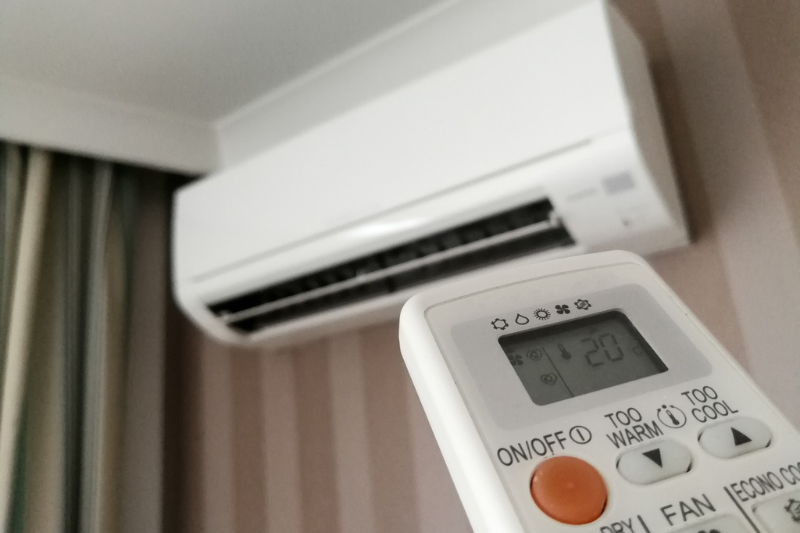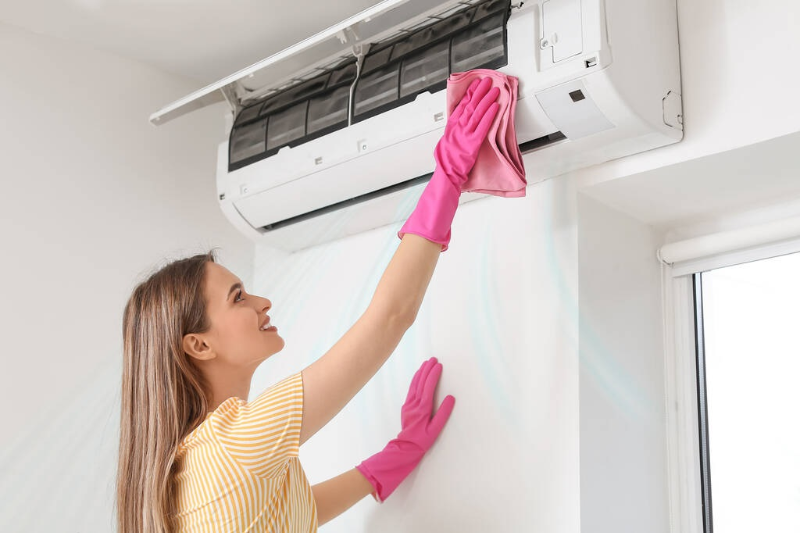Table Of Contents
Welcome to a world where air conditioning does more than just cool your space. Climate control air conditioning is about mastering your environment for both comfort and efficiency. With Sydney’s unpredictable climate, understanding the ins and outs of these sophisticated systems can be a game changer for any property owner.
In this comprehensive guide, we’ll explore how climate control systems work, their numerous benefits, the different types available, how to maintain them, and much more. We’ll also provide a thorough insight into why upgrading to climate control could be your next best home improvement decision. Read on for more!
How does climate control air conditioning work?
Climate control AC systems represent a significant advancement in indoor comfort, employing sophisticated technology to ensure your environment is exactly as you prefer. Let’s delve deeper into their operational mechanisms:

Core technology
At the heart of climate control is a suite of advanced sensors and computer-controlled mechanisms that actively monitor and adjust the indoor climate. This includes regulating temperatures, humidity levels, and even air quality, ensuring every aspect of your indoor environment is meticulously managed.
Temperature regulation mechanisms
These systems go beyond simple heating and cooling; they fine-tune the indoor atmosphere using precise temperature gradients and airflow adjustments to create a consistently comfortable environment, free from the fluctuations often experienced with traditional AC units.
Role of thermostats and sensors
Modern climate control systems utilise state-of-the-art thermostats and sensors to gauge and precisely respond to real-time environmental changes. This technology ensures that every room within your space consistently meets your predefined conditions without manual intervention.
Zoning importance
One of the standout features of climate control systems is their ability to manage multiple zones independently. Whether it’s different rooms or entire floors, these systems can customise temperature settings for individual areas, providing personalised comfort while optimising energy usage.
Smart home integration
Integrating climate control systems with smart home technology enhances convenience and efficiency. This feature allows homeowners to adjust settings remotely via smartphones or other devices, ensuring their home environment is perfect even before they walk through the door.
Key benefits of climate control air conditioning
Investing in a climate control system is beneficial not just for its primary function of regulating temperature but also for its broader impacts on home comfort and operational efficiency:
Consistent indoor temperatures
With a climate control system, indoor temperatures are maintained with remarkable precision, ensuring that every corner of your home remains precisely how you like it—no more adjusting the thermostat multiple times a day.
Enhanced air quality
Advanced filtration systems in climate control units can significantly improve the air quality of your home. These systems can filter out dust, allergens, and other pollutants, which is particularly beneficial for those with allergies or respiratory issues.
Energy and cost efficiency
Climate control systems are designed to maximise energy efficiency, which translates to lower utility bills. By only heating or cooling occupied spaces to the required levels, these systems avoid the wasteful energy consumption typical of traditional HVAC units.
System longevity
Efficient operation and reduced system component strain can extend the lifespan of your HVAC equipment. Due to their advanced operational modes that minimise wear and tear, climate control systems are less likely to undergo frequent breakdowns.
Adaptability to Sydney’s climate
Designed to handle Sydney’s diverse and often harsh climate conditions, climate control systems offer a robust solution for maintaining indoor comfort year-round. Whether it’s the peak of summer or the chill of winter, these systems ensure your home environment is always welcoming.
Types of climate control systems
Choosing the right climate control system can significantly impact your home’s comfort and energy consumption. Here’s a breakdown of the options available to help you make the best choice:
Centralised vs. decentralised systems
Centralised systems manage the climate from a single point, distributing conditioned air through ductwork. In contrast, decentralised systems, such as split or multi-split systems, allow for independent control of different areas without ductwork, offering flexibility and reduced energy loss.
Comparison: split, multi-split, VRF/VRV
Split systems are ideal for single rooms, while multi-split systems can handle several rooms independently, each with its own thermostat. Variable Refrigerant Flow (VRF) or Variable Refrigerant Volume (VRV) systems offer even greater efficiency and control, making them suitable for larger properties with varying occupancy and usage patterns.
Maintenance tips for optimal performance
Regular maintenance is crucial to ensure your climate-controlled air conditioning system operates at its best. Here’s how to keep your system running smoothly:

Cleaning and servicing frequency
Regular cleaning and annual servicing by professionals help prevent common problems and extend the system’s lifespan. Ensure filters are cleaned or replaced regularly to maintain air quality and system efficiency.
Importance of professional care
Engaging a qualified HVAC technician for regular inspections and maintenance can diagnose issues before they escalate into costly repairs. Professional servicing ensures that every component of your climate control system is in top condition.
Troubleshooting common issues
Be aware of signs like uneven cooling, strange noises, or unexpected increases in energy bills. These could indicate underlying issues that require professional attention.
Seasonal maintenance
Prepare your system for peak seasons
Clean and check it before summer and winter to ensure it operates efficiently when needed.
Timing for upgrades
If your system is older and repairs are becoming more frequent and costly, upgrading to a newer, more efficient model might be more economical.
Environmental impact of climate control systems
While climate control systems are designed for comfort and efficiency, they also have a positive impact on the environment when used responsibly:
Reduction in carbon footprint
Modern climate control systems can significantly reduce your home’s carbon footprint by optimising energy use, contributing to global efforts against climate change.
Energy consumption comparisons
Climate control systems often use less energy than traditional HVAC systems, cooling or heating spaces only as needed and maintaining precise temperature control.
Sustainable features
Many modern systems include eco-modes and programmable settings that minimise energy use without sacrificing comfort.
Impact on local and global environments
Reduced energy consumption leads to lower emissions, benefiting local air quality and global atmospheric conditions.
Future trends in eco-friendly technologies
Advancements in HVAC technology continue to improve energy efficiency and environmental friendliness, promising even more significant reductions in energy use and emissions.
Financial Considerations
Investing in a climate control system involves upfront costs, but the long-term savings and benefits often justify the initial expenditure:

Initial investment analysis
While the upfront cost of a climate control system can be higher than conventional systems, the long-term financial savings on energy bills can offset this over time.
Cost-benefit over time
Climate control systems’ energy efficiency means lower monthly energy costs. Plus, reduced wear and tear extends the system’s lifespan, decreasing the overall cost of ownership.
Potential savings on energy bills
Efficient temperature and zone control allow for significant reductions in energy consumption, which can dramatically lower energy bills, especially in climates like Sydney’s.
Value addition to property
Installing a modern climate control system can increase the value of your property, making it more attractive to prospective buyers or renters.
Available rebates and incentives
Check for local government rebates or incentive programs that encourage the installation of energy-efficient systems. These local government rebates or incentive programs can help reduce the initial cost.
Conclusion
Climate control air conditioning is more than just an upgrade; it’s a smart investment in comfort, efficiency, and sustainability. With the capabilities to tailor your indoor environment to your exact preferences and significant energy and cost savings, these systems represent the future of home climate management. Whether renovating your home or building new, consider how climate control can transform your living space into a haven of comfort and efficiency.
Consult a professional to explore the best options for your needs and start enjoying a more comfortable, controlled, and cost-effective home environment today. Consulting with a professional lets you make informed decisions to create a relaxed, efficient, cost-effective home environment.



